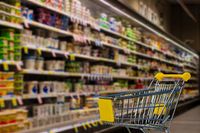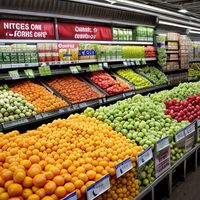On the eve of Thanksgiving, a tale of two grocery stores unfolded across the American landscape. In one, the shelves stood bare, devoid of the eggs that are a staple in the feasts of celebration. In another, an hour and a half north in Richfield, eggs could be found, but they came with a price tag swollen by 40%, a stark reminder of the economic winds that have been blowing through the nation.
The story of these two stores is not just about the absence or presence of eggs; it is a microcosm of the broader economic challenges facing American consumers. The surge in grocery prices has turned what should be a time of abundance and gratitude into a period of scarcity and financial strain for many households.
In November, a silent shockwave rippled through the economy as egg prices surged by 8.2%, one of the most dramatic monthly spikes in the past two decades. This was not an isolated tremor; it was part of a broader seismic shift in the cost of living, with beef, coffee, and non-alcoholic beverages joining the chorus of rising prices. The overall grocery prices experienced their largest monthly gain since January 2023, a stark escalation that has left many Americans feeling the pinch.
The avian flu outbreak has decimated flocks, reducing the supply of eggs just as the holiday season, with its increased baking, cooking, and dining out, drives up demand. The USDA has revised down its estimates for the US egg supply and raised price forecasts for 2025, painting a picture of a market under strain.
Beef prices have been on the rise as well, with the US cattle inventory at its lowest level in over 70 years. Drought and other rising costs have taken a toll, and the contraction is expected to continue through 2025, with the prospect of herd expansion not expected until 2026 or 2027.
The combination of reduced supply and steady demand has created a perfect storm for beef prices. Ranchers face higher feed costs due to drought conditions, while consumers continue to demand beef despite the increasing prices. This imbalance in the market shows no signs of easing in the near term.
Orange juice, both frozen and fresh, has seen its prices climb due to hurricanes, bad weather, and a citrus disease. The situation is further complicated by Brazil's worst harvest in decades, caused by flooding, drought, and citrus greening disease, which supplies about 30% of America’s imported OJ.
The impact of climate change on agricultural production is becoming increasingly evident. Extreme weather events disrupt growing seasons, damage crops, and increase the risk of disease, all of which contribute to higher prices for consumers.
Coffee, too, has not been spared. Weather events that have impacted Brazil’s citrus production have also affected the second-most consumed beverage in the US. Arabica coffee beans, which make up the majority of global coffee bean production, have reached record highs, with the future looking cloudy for coffee lovers.
The coffee market is global, and disruptions in one region can have significant effects on prices worldwide. Brazil's struggles with weather and disease have reduced supplies, leading to higher prices and concerns about future availability.
Chocolate, derived from cocoa, has seen a 108.7% increase in wholesale manufacturing costs annually. Adverse weather events in West Africa, responsible for over 70% of global cocoa supply, have slammed the industry, leading to shrinking product sizes, modified recipes, and a heavier reliance on non-chocolate offerings.
The cocoa market is facing multiple challenges, from climate change to political instability in key producing regions. These factors have combined to create a supply crisis, resulting in higher costs for chocolate products worldwide.
These price increases, while seemingly outliers, add another layer of costs to products that have become significantly more expensive since before the pandemic. The once-in-a-generation bout of high inflation, caused by a confluence of factors that emerged because of the pandemic, war in Ukraine, and other events, weighed heavily on Americans and ultimately propelled former President Donald Trump back to the White House.
The current inflationary environment is the result of multiple intersecting factors. Supply chain disruptions, labor shortages, and increased demand for certain products have all contributed to rising prices. The situation is further complicated by global events such as the war in Ukraine, which has affected energy prices and agricultural supplies.
Economists and food industry experts say it’s not that easy to avoid rising food prices, so consumers and businesses alike have been forced to adapt. “I think we’ll continue to see that consumers are looking to stretch that food dollar any way they can, not just because of the price of food, but also because it seems like the price of everything is going up,” said Billy Roberts, senior analyst for food and beverage at CoBank.
Consumers are changing their purchasing behaviors, seeking out discounts, and substituting cheaper alternatives for more expensive items. This adaptation is a response to the sustained pressure of inflation on household budgets.
For businesses like Vidlak’s Brookside Cafe in Omaha, Nebraska, the rising costs of critical ingredients have meant getting creative. Founder Roger Vidlak has turned to cage-free eggs and liquid egg mixes, which have been less impacted by the avian flu and are considerably cheaper. “I haven’t raised my prices for, oh, probably six months,” he said. “I just kind of absorb it.”
Businesses are implementing various strategies to manage increased costs without passing them entirely to consumers. This includes menu adjustments, ingredient substitutions, and operational efficiencies.
In this new era of inflation, where the prices of everyday goods seem to dance to the beat of a drum that grows louder with each passing month, Americans are faced with the reality that the best one can hope for is stabilization in prices. The days of prices falling significantly and reverting to pre-pandemic levels are unlikely, a fact that has forced consumers and businesses to find new ways to navigate the changing economic landscape.
It is a time of adaptation, of creativity, and of resilience, as the American spirit strives to endure in the face of economic uncertainty. The lessons learned during this period will shape consumer behavior and business practices for years to come, as households and companies alike develop new strategies to thrive in an environment of persistent inflation.

By Eric Ward/Dec 19, 2024

By Joshua Howard/Dec 16, 2024

By Michael Brown/Dec 16, 2024

By Jessica Lee/Dec 16, 2024

By Laura Wilson/Dec 16, 2024

By Olivia Reed/Dec 16, 2024

By Sarah Davis/Dec 16, 2024

By Emily Johnson/Dec 16, 2024

By Olivia Reed/Dec 16, 2024

By Michael Brown/Dec 16, 2024

By Eric Ward/Dec 16, 2024

By Thomas Roberts/Dec 11, 2024

By Daniel Scott/Dec 11, 2024

By Samuel Cooper/Dec 11, 2024

By Grace Cox/Dec 11, 2024

By Sophia Lewis/Dec 11, 2024

By Megan Clark/Dec 11, 2024

By Joshua Howard/Dec 11, 2024

By Eric Ward/Dec 11, 2024

By Olivia Reed/Dec 11, 2024